#燎原
Explore tagged Tumblr posts
Note
Can you recommend contemporary setting danmei with heart-touching romance? I mean any heart-touching danmei that take place in our regular every day world and not sci-fi/fantasy/xianxia/wuxia/ABO/historical ancient/rebirth/transmigration.
Sorry for being fussy, it's just so hard to find interesting danmei since i've been stuck in reading slump.
Hello!
To me, the kind of romance that really touches my heart are usually the ones that help the characters grow out of their insecurities or move on from their trauma, so there is some level of angst in the background. If you are looking for something else, let me know and I'll be happy to recommend something different!
My list:
有名 木更木更 – In Name Only
网恋翻车指南 酱子贝 – Guide on How to Fail at Online Dating
粉黛 七世有幸 – Concealed and Blended: Fendai
FOG【电竞】 漫漫何其多 – FOG
心眼 北南 – The Eye of the Mind
我只喜欢你的人设 稚楚 – I Only Like Your Made-up Persona
楚天以南 大风不是木偶 – Under Clear Skies
燎原 不问三九 – Wildfire
(I'm copying & pasting some text I wrote in other posts on this blog)
有名 木更木更 – In Name Only
[actors/celebrities, fake relationship, mature characters] – Two award-winning actors fake a relationship to quash a scandalous rumor, and gradually get to know the real person behind the other’s accomplished career and polished public persona. The tone of the story veers is mostly sweet and funny, with a splash of angst that they conquer together. It’s really comforting and relaxing to read about the love story of “mature men” in their early 30s who know how to communicate productively, take care of the people they like, and really accept and empathize with each other’s imperfections.
网恋翻车指南 酱子贝 – Guide on How to Fail at Online Dating
[online gaming, college-setting, cat-fishing, mistaken identities] – Jing Huan poses as a girl in an online game to catfish the famous player who tricked and hurt his cousin. Meanwhile, Xiang Huaizhi notices photos from the "girl" who keeps flirting with him in an online game can only be sent by one underclassmen at his school. There is plenty of comedy in Jing Huan’s effort to pose as a girl online, and also plenty of hurt when the truth and deception are laid to bare, but overall this is a sweet college romance with just dash (or maybe a spoonful?) of angst and plenty of humour. (PSA: No knowledge of gaming is needed (I don’t have any) to follow the story.)
粉黛 七世有幸 – Concealed and Blended: Fendai
[entertainment industry, actor x makeup artist] – I really like this novel because it presents acting and art as skills that the characters must practice and develop; the main characters are not geniuses who can take their careers for granted. The gong is a makeup artist, who considers himself straight but cross-dresses as a branding gimmick to advance his career. The shou is a retired E-sports player-turned-idol actor, who is secretly gay and has no real passion for performance. The novel starts off with funny interactions between “straight pretending to be queer” vs “gay pretending to be straight.” Eventually, they develop a deep bond after collaborating on a series of projects, and help each other discover their true career aspirations.
FOG【电竞】 漫漫何其多 – FOG
[E-sports, (sort-of?) reconciliation] – (it’s a fictional game so no prior gaming knowledge needed). Yu Sui brought Shi Luo into the industry, but within the year, he broke up the team, went to an elite club in Europe, and sold Shi Luo to a different club in China. What will Shi Luo do when Yu Sui comes back? As an E-Sports novel, FOG does a great job of portraying the camaraderie between teammates and the youthful passion of the players, while also touching on the cynical and exploitative side of the industry. There is an extremely sad and infuriating backstory that explains why the main couple had to be separated for two years (it’s not their fault), but their relationship is otherwise very sweet.
心眼 北南 – The Eye of the Mind
[unsure about translation status][reconciliation, (eventual) step brothers, hurt/comfort, slice-of-life ] -- Liang Cheng enters Qiao Yuanlin’s life three times, as a stranger who saves his life at 13, as the mysterious tenant renting his grandmother’s extra room when he was 16, and as his step-mother’s adopted son six years later. However, there is another hidden thread connecting their histories together. In many ways, this is a coming-of-age story for Qiao Yuanlin, who is born with a serious congenital heart defect that has permeated every aspect of his life, but he still manages to grow up with a very realistic blend of good nature, naivete, and bratty-ness. He has to cope with his heart condition and his parents' divorce in adolescence, and later develop his own identity and values as a young adult and professional. This novel also has the most satisfying illness-comfort-recovery arc I have ever read thanks to Qiao Yuanlin’s heart (and of course Liang Cheng is his doctor).
我只喜欢你的人设 稚楚 – I Only Like Your Made-up Persona
[Official licensed and fully published in English as "Rose and Renaissance")] [entertainment industry] -- Xia Xiqing is a professional artist who also draws fan art for Zhou Ziheng, the nation's most beloved young actor. The best part of this story is the clash of "personas": Zhou Ziheng (gong) is a serious and hardworking star actor and college student; while Xiqing (shou) is a rebellious art school grad who was a bit of a playboy in his past. After an accidental encounter, Zhou Ziheng immediately dislikes Xia Xiqing, but they unexpectedly become neighbours and also star on a reality show together. Then, they get to know the real person behind each other's superficial persona, develop a deep bond, and even help Xiqing heal from his childhood trauma.
More...
There two are very popular stories I read partially, and I hope to revisit and finish them someday. They have very compelling romantic arcs, but the main story lines are more heavy and less "fairytale":
楚天以南 大风不是木偶 – Under Clear Skies :: on a site visit to a rural village, young professor Tang Heng meets his ex-boyfriend from grad school, whose life has taken a turn completely unlike his own. It's a story that digs deep into inequalities, privileges, family dynamics, and abuses of power, and love that survives despite all that.
燎原 不问三九 – Wildfire :: A tattoo artist begins a relationship with his blind younger brother's optometrist. The main draw of the relationship is that both characters older (mid-30s) so they are more mature, but that also comes with a different set of challenges.
For today's recommendations, I left out
angst-heavy romances that break your heart but somehow you (or the characters) still want it to work out
super-light stories that are sweet and fluffy or funny all the way through
stories that are completely untranslated
But if those types sound interesting to you, I'm happy to recommend some!
I hope you find something you can enjoy! 😊
#danmei novels#modern danmei#romance danmei#danmei recs#有名#my reading#In Name Only#Guide on How to Fail at Online Dating#fendai#The Eye of the Mind#Rose and renaissance#FOG【电竞】#心眼#我只喜欢你的人设#楚天以南#网恋翻车指南#燎原#fog电竞#wzxhndrs#粉黛
9 notes
·
View notes
Text
眾所皆知水鏡八奇會被劇情殺死光。讓我以 66卷後未看完全不知道下面的中計中計中計是中啥胡扯一通吧。
目前一奇劇殺、四奇咳死、周郎很重自殺性傾向+時運低易見鬼(孫伯符)巴不得下去找(前)主公。公瑾已半身入棺材,當死了。
賈詡又公子獻頭,獻了自己的頭。
鳳雛覺刺青只刺半邊臉不平衡,在另半臉也刺、當軍師壓力大脫髮,被殘兵2.0誤以為左慈什麼仙術起死回生KO
諸葛孔明頭上那頂要戴另一頂帽也不脫的帽子是寄生的。那頂怪帽才是本體。帽��下的話就會找下一個宿主。
八奇壯士決+左曲右���被對手上直下轉。
想不下去了。荀彧最近出場機會比火少,我根本完全忘了他是誰和名字怎樣讀。
2 notes
·
View notes
Text

nice to see yet another online/mobile game collaboration with Ravages (and what's more, in this case the dream monster from chapter/episode 1 might be playable in addition to Liaoyuan Huo)
3 notes
·
View notes
Text

According to auto-translate, I think The Ravages of Time (火鳳燎原) season 2 will be released some time next year? I can't wait to see how Cao Cao is portrayed in this animation. Also looking forward to other characters who had yet to appear. <3
5 notes
·
View notes
Text
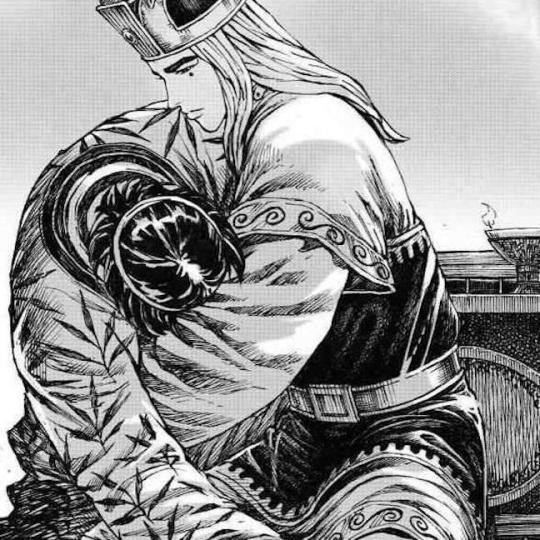
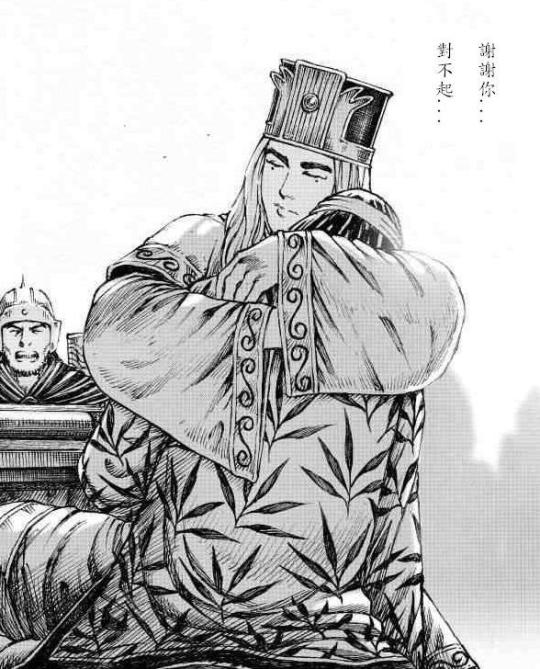
#国家死了
5 notes
·
View notes
Text
China Keeps Trying to Crush Them. Their Movement Keeps Growing.
Mr. Johnson is a Pulitzer Prize-winning journalist who spent two decades in China. In 1959, a group of university students in the northwestern Chinese city of Tianshui embarked on a quixotic plan. China was in the midst of the Great Famine, a catastrophe caused by government policies that would kill as many as 45 million. These young people had witnessed farmers starving to death and…
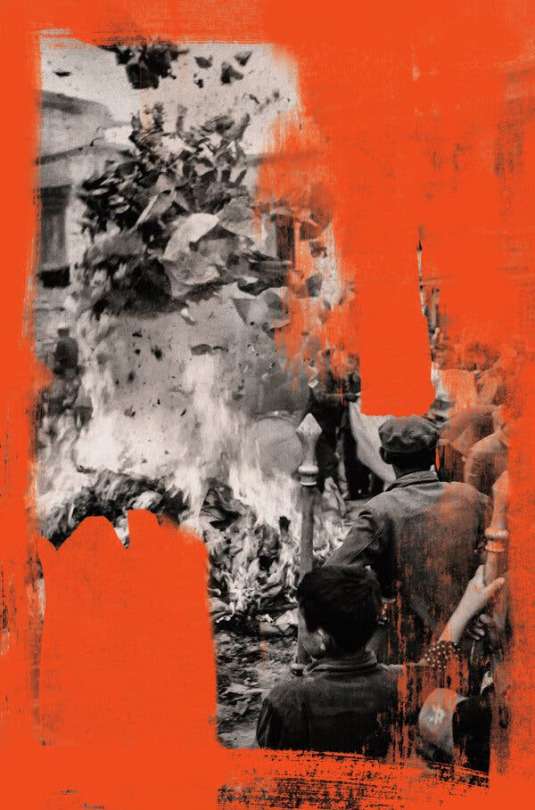
View On WordPress
0 notes
Text
Translation of 燎原の火の燃ゆる日/ Days of Burning Wildfire / Promised Wildfire
I wasn't planning on making this tumblr have translations but I guess it will!! You can find my original post here below!
I did a simple translation of the Japanese version of Promised Wildfire also known as 燎原の火の燃ゆる日/ Days of Burning Wildfire.
I am not a native speaker so there are things I probably misunderstood or got wrong. But dang the VA, Mr. Shinnosuke Tachibana, had me clutching my pearls! I usually listen to it in Chinese with English subs so it was a first for me to hear the Japanese versions with the Japanese text, and it was so pleasant!! And dang I love Homura/Qi Yu/Rafayel so much lmao.
My thoughts on the English localization compared to the Japanese is that I understand why they localize the way they do, and it makes sense. I think it's pretty close to the Japanese version, but there are differences. There are a few conditional statements in Japanese which makes me like the characterization of Rafayel and his relationship with MC so much more.
One of the differences is the "If I don't do this..." vs "But this is how you do it..." - I prefer the Japanese version over the English localization because the こうしないと has an implied condition to the statement, showcasing cause and effect of her romantic surprises e.g. "If I don't kiss her endlessly then how do I show my appreciation?" Which also connects with the following line that explicitly follows up with "By what means should I show my appreciation?"
Or "bold" vs "greedy." I prefer the characterization of greedy.
Anyways, it's just little nuances like that which are fun to compare over.
I hope you enjoy!
P.S. if you have any corrections you wanna give me for the translation, let me know - I looked it over twice to make sure I didn't transcribe wrong.







#love and deepspace#rafayel#lads#lads rafayel#rafayel love and deepspace#rafayel lads#rafayel qi#qi yu#qi yu love and deepspace#lnds#lnds rafayel#l&ds#l&ds rafayel#fandom: lads#homura#translation
39 notes
·
View notes
Text

10月24日発売のTCG『Z/X Zilions of enemy X』ブースターパック第50弾 星火燎原編 爆煌!閃光星<ステラ・スパークル>にて「SSD特攻鮫 ヘクサンキ」のイラストを担当しました!ヘクサンキちゃんまた描けて嬉しい🦈 どうぞよろしくお願いしますー!
44 notes
·
View notes
Text
「宮崎正弘の国際情勢解題」
令和七年(2025年)1月6日(月曜日)弐
通巻第8583号
トランプ政権は「さようならDEI」である。
『オバマの家来』エマニュエル駐日米大使が日本から去る。
*************************
トランプの大勝の意味は極左政権だったバイデン時代の終わりではない。米国をはんぶん破壊した「オバマ時代」(バイデン時代とはオバマ院政だから合計12年)の終焉なのである。
「民主党の高層部に陣取った極左集団はくさっている。全体主義と変わらない」と言って、RKJもトゥルシー・ギャバードも飛びだした。前者はトランプ政権で厚生長官、後者は国家情報長官となる。
オバマ・バイデンの十二年間つづいた「悪政」とは、公務員や追随する広告代理店や弁護士やコンサルタントを動員して欺瞞の政治目的を拡販してきたこと、「人道主義」をいう美名で隠蔽した中身とはアメリカを社会主義的全体主義国家と塗り替えることだった。
第一に「人口構成が運命だ」という妄想があった。白人の出生率が激減している一方で、黒人、ヒスパニック、アジア系の移民が急増し、人口構成を逆転する趨勢を加速させる。
そうすれば極左政党が半永久的に政権の座を維持できるという妄想に基づいた計画だった。
反対の選挙結果だった。ヒスパニックと黒人の民主党支持が顕著に激減し、そのうえ労組が民主党支持から離れた。
これらの基層部分は依然として民主党へ入れたが、曾ての固定票ではなくなっていた。民主党の牙城といわれたNYCやロスでトランプは大幅に得票を増やした。
第二にオバマ院政下にあったバイデンは就任後、90の連邦機関に人種優遇とDEI規則を義務付けた。「左派のネオ・レイシズム」である。
全米でアンチDEI運動が燎原の火のように燃え広がった。
第三に国境開放を解放し、1600万人とも言われる不法移民を受けいれたことは逆にヒスパニック系の票を失った。『聖域』といわれた都市は治安悪化に悲鳴を上げた。
第四に石油・ガス産業に対するグリーン・ニューディール戦争は、環境問題に関心のある若い有権者を引き寄せるはずだった。石油ガス業界を「オバマ院政』(バイデンの四年)で完全に敵に回した。皮肉にも環境規制強化が中国のEV産業を飛躍させアメリカの三大巨人の経営をふらふらにした。自動車労組も幹部を別として、バイデン支持を離れた。
第五に反イスラエルキャンペーンである。ハマス支持の過激派の言動をバイデン、ハリス政権は正当化したが、反イスラエル、そして反ユダヤ主義の左派の票を獲得できなかった。そればかりか民主党の基盤だったユダヤ人の相当数が共和党へ鞍替えした。
▼『オバマ時代』とは『ポストモダン宗教』だった
こうしたオバマ・バイデンの十二年間に猖獗した「ポストモダン宗教」はオバマ時代に急速に勢力を拡大した。妖しげなNGO、コンサルタントと称して企業の幹部に落下傘降下し、顧問弁護士とか社外取締役として当該企業のWOKEを見張った。
消費者の反乱がおきて、バドワイザーなど、販売を四割も落とした。BLMなど過激な活動家グループ、インスタントな財団、公務員組合などが納税者の資金で支えられた。
この急拵えの亜官僚システムは連邦および州の機関、公立学校、そしてアメリカ企業に強制した『研修』と称する仕組みにあった。つまり「DEI産業複合体」だった。
トランプ政権は「さようならDEI」である。
学生ローンの減免など、「平等保護」ではない。多くの異議申し立てがあり、各地で訴訟に発展した。トランプ政権のDOGE設立と、その大鉈で崩壊しそうだ。
オバマ政権は系列の左派知識人を動員し、例えば欠陥だらけのイラン核合意について、主流メディアや政治エリートに虚偽や誤解を招くような話を売りつけ、その後、反対意見を封殺した。
この仕組みは、 ロシアゲート、ハンター・バイデンのラップトップ、その他多くの多くの論点において、有権者の70%が主流のニュースメディアを 信用しなくなり、FOXニュースとカールソンの番組とネットの記事とトランプのXへの投稿、SNSに拡がった保守の主張への支持となった。
バラク・オバマは巧みな演説で時に人々を感動させた(というより誤解させた)が、このようなホワイトハウスの陰湿で陰謀的な政治が民主党を全体主義的ムードへと導いた。惨敗後、民主党執行部は空中分解、自ら首を絞めたのだ。
米国の財界、ウォール街は雪崩のようにトランプ政権にアプローチを進めている。
メディアもすっかり様変わりだ。ワシントン・ポスト政治風刺漫画家が、同紙オーナーがトランプを思わせる銅像前に土下座する様子を描いた漫画の執筆し、それが没になった直後、辞任した。
漫画家のアン・テルナエスは「私がペンを向けた対象や人物のせいで漫画が削除されたのは初めて」と投稿した。その風刺漫画には、アマゾンの創設者でワシントン・ポストの所有者であるジェフ・ベゾスや、フェイスブックとメタの創設者マーク・ザッカーバーグ、その他のメディアやテクノロジー界の大物たちが、巨大なトランプ銅像(金日成親子を思わせる)の前でひざまずいてお金��入った袋を掲げている様子が描かれていた。ABCニュースを所有するディズニー社のシンボルであるミッキーマウスがひれ伏している姿も描かれた。
ABCニュースは、ニューヨークでの性的虐待裁判の報道をめぐってトランプが名誉毀損で訴えた事件で、1500万ドルの和解に同意した。
テルナエスは風刺漫画の不掲載は今回が初めてだとし、「これは状況を変えるものであり、『報道の自由』にとって危険だ。民主主義は暗闇の中で死ぬ」と逆の捨て台詞を残した。
『オバマの家来』エマニュエル駐日米大使はやっと日本から去る。
最悪の評判を取りながらもウクライナ支持、LGBTQ法の強要など、忠実にオバマの社会破壊活動を実践してきた���、つぎには民主党全国委員会の委員長への立候補を検討している。
エマニュエルは2009~10年にオバマ大統領の首席補佐官を務め、シカゴ市長に当選し、バイデン大統領から駐日大使に指名された。この背後にオバマがいたことは明白、そもそもバイデン政権の閣僚は殆どがオバマの指名だった。
日本にとってじつに迷惑千万の外交を展開した。
26 notes
·
View notes
Text
Ravages has novels I'm going to go bankrupt
1 note
·
View note
Text
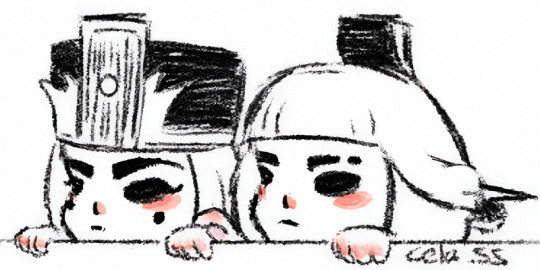
the various fan art featuring the two Xun would appear more melancholic in light of the latest Ravages chapters...
2 notes
·
View notes
Text

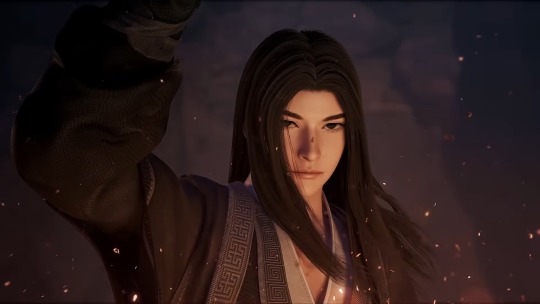
Sima Yi and Sima Yi. They're practically opposite of each other and I love them.
4 notes
·
View notes
Text
Request from @thirdlotusprince3: Do you think you could find a Nezha and Ao Bing Mystery/Detective fic? I would love that.
bird's-cry to loving you by Anonymous
Summary: Snippets of bamboo carved from the story of Ao Bing and Nezha, on the opposite sides of prison bars, separated yet together in their circumstances. Alike yet different in their fates. Cycling through phases like the watchful moon. Friends. Muses. Lovers. Husbands. Strangers. Enemies. Soulmates.
Words: 2,078 Chapters: 1/?
(Technically not mystery/detective but I thought a prison AU adjacent to that.)
【云冰】业火焚舟 by @bayeyeye:
Summary: >小警察✖️二世祖 >黄里搞纯爱⚠️ >设定在现实世界 308大案,九级村群体性癔症。 初出茅庐的小警察李云祥分配到重案组特别部门实习,跟随小队调查此案,看似简单的案子却被德家三公子横插一脚。八字不合,缘分天定。李云祥又开始做起小时候做过的同一个梦,梦中琥珀色的眼,告诉他,来见我吧。 极东之土,万河入海。丘山横卧,瘴气纵生。人烟罕至之处,万山环绕之间,有一海眼,极深,不可测。闻古人言,直通幽冥。 相传明朝天启六年,山火燎原,海眼坠龙。
Translated Summary: Young Police Officer X Second-Generation Heir Pure Romance in a Crime Thriller ⚠️ Set in the Real World The 308 Major Case: a mass hysteria incident in the Jiuji Village. Rookie police officer Li Yunxiang is assigned to intern at the Special Unit of the Major Crimes Division. He followed the team to investigate the case. What seemed like a straightforward case is unexpectedly disrupted by the intervention of the third young master of the De family. Their personalities clash, yet fate has other plans. Li Yunxiang began to have the same dream he had when he was a child. The amber eyes in the dream told him to come find him. "Come find me." IIn the far east, thousands of rivers flow into the sea. Hills and mountains lie across the land, and miasma is rampant. In a land rarely touched by human presence, deep within an unbroken mountain range, there lies the eye of the sea, unfathomably deep. Ancient texts speak of it: A gateway straight to the underworld. According to legend, in the sixth year of Tianqi in the Ming Dynasty, a fire spread all over the mountains, and a dragon fell into the eye of the sea.
(This is Li Yunxiang/Ao Bing but I count it as Nezha/Ao Bing because he's a reincarnation of Nezha.) Fic not translated, let me know if you're interested in an English translation!
8 notes
·
View notes
Text
迷上篮球帅哥
林强,迪是我的两个朋友,都是在网络上认识,一个是公司的小白领,另外一个是田径队的教练,由于他们俩都喜欢像我这样的高大魁梧型的男人也都喜欢玩脚,所以时常相约一块来找我玩3P。这种关系促使下我成了他们的头,只要有空就找他们俩来聚聚。
有一天我请他们喝咖啡,看他们俩鬼鬼祟祟地谈论着什麽,我就问他们,「说什麽呢。」
「嘿,朱哥,我们发现刚走过是篮球队新进来那个外地的大学生,人长得���级帅,和你有得一拼哦!」林强快嘴说道。
「是吗,你们俩小子起花花肠子了啊!是不是嫌皮痒了?」我故作强横。
「哪裏哪裏,我们只是想找他给您过过目,看要不要一块玩玩,你是大哥嘛」迪说道。
「还是迪子你懂事,哥回去打赏你个波」我揉了揉迪的寸头。
「来了来了!哥你看!」林强说道。
说曹操曹操到,只见一个一米九多的一个健壮男孩走了进来,身上穿着一套灰色长袖运动服,挺拔的身姿和俊美的外表立马吸引了所有人的眼球,而且不像许多篮球队员那样四肢发达,头脑简单傻愣愣的,他的动作十分干净利落,让人油然生出一些好感。
「朱哥,朱哥,看傻了?」人都走了好久,见我还在发呆,迪在我面前晃了晃手。
「操,这货色太他妈好了!」我直拍桌子,惹得周围的人都往我这边看。
「哥,哥。。。你要淡定。」林强说
「甭淡定了,我有法子搞定他」迪故作神秘。
「哦?什麽法子?」我好奇道。
「今晚9点,我们在体育馆见面,我再告诉你们!」迪深深秘秘地说道。
于是一个下午都在兴奋中度过,好不容易到了晚上9点,我只身来到体育场。
远远看见刚刚穿着西装的下班的林强,便朝他走了过去。
「餵,林强,你说迪这家伙会怎麽弄,不会用强的吧?」我有些发憷,毕竟自己从来没有做过案。
「不知道,迪这家伙平时鬼点子就属他最多。不知道今天他玩什麽花样,反正就看他了。」
「滴滴」,一辆雪白的车灯照过来,一个小面包车出现在我眼前,一个头探出来,我们眯着眼一看:「操,迪,你哪裏弄的车?」
「队裏借的!」迪乐呵呵地说,眼中充满了兴奋。
「你借车干嘛?」林强问。
「一会你就知道了,上车吧!」
不一会儿,我们便把车开到了一个窄窄的小巷子,这裏一盏灯都没有。
「操,月黑风高的!你不是要杀人越货吧?我可不姦尸啊!」我喊道!
「别着急嘛!一会你就知道了」迪神神秘秘地跳下车。朝巷子口走去,我和林强面面相觑。
估计过了10分钟,我正要下车抽根烟,看到迪兴奋地跑过来:「哥,���我来!强子也过来。」
于是我们往巷子口那边走,只看见巷子口的角落裏有一个人躺在那裏。
「妈呀!你真杀人啦!」我惊讶地叫出声来。
迪嘿嘿一笑,说「没有,我用了这个」迪拿出了手上的一个警用电棒。
我走上前去仔细一看,可不是,那个帅哥正躺在那裏,胸脯还一动一动的,证明没死。
「哥,咱这麽干行麽?」林强不禁担心道。
「这一时半会会醒麽」我没搭理林强,转开问迪。
「没事,半个小时不会醒,我拿自己做过试验!半小时以后我自有办法」迪嘿嘿地笑了。
「靠,你丫也当电击男了啊!」我开玩笑道。
迪笑着说:「为小兄弟献身啊!」然后过去?起他一只脚,对我和林强说:「别愣着了,赶紧搬人!这家伙至少有190斤,我可搬不动」
我看着那个帅哥的胸脯和胯下硕大的一包,其实下身早就有反应了,于是我便推了推林强,我托着他的上身,他俩各抱一只脚,就把他塞进了车裏。
迪钻进驾驶室立马就开车往公路疾驶。我和林强则坐在后排,帅哥太高了,我们只有让他稍微弓着身子才能勉强将他横放在座位上,我将帅哥的上半身抱在怀裏,林强则固定住他的下肢。我看着帅哥心中心猛跳,情不自禁便去吻他薄薄的嘴唇。林强刚开始虽然貌似很担心,但是跟着我们上了贼船之后,又看我立马行动起来后,也就感觉豁出去了,两只手开始在帅哥的大腿内侧和屁股上摸来摸去。
迪回头一看,说:「靠,你们两个先下手为强啊,也不看看是谁的功劳,别弄了!一会把他弄醒来了就不好了。」
于是我们就没好意思再弄了。不过我还是偷偷拉住帅哥的大手轻轻摩挲着。
车开了十多分钟,我们来到一个貌似仓库一样的地方,裏面有许多训练用的垫子。
「这是哪裏?」我问。
「以前体校的仓库,现在荒废了,也没什麽人来,我看了周围也没有摄像头,刚好适合我们玩!」迪说道。
「来,我们把他搬到那个垫子上去。」林强似乎已经完全进入状态了,有点迫不及待的样子,我看了一眼,他的名牌毛料西裤下面已经顶起一顶大帐篷了。
「别急,先干好准备工作!」迪说着,拿出一个包。
裏面有几根麻绳和透明胶带。还有一些针剂一样的东���。
「这是什麽?」我指着针剂问道。
「迷幻药」迪将帅哥的手绑在了垫子的两个角之后,又用一块黑布蒙上他的眼睛后,对我「嘿嘿」一笑说道。
��操!你他妈还真专业!」我说,我知道这迷幻剂就是会让人出现幻觉的一种毒品,不会让人上瘾,但是会让人持续出现幻觉,就跟喝了酒一样,第二天啥事也记不起来。
林强也好奇地问道「你哪搞的,靠谱吗」
迪神秘的说道:「搞体育的总是要有两把兴奋剂刷子的!」说着把药液抽出来,用胶带扎住帅哥的手臂,对准一个青筋就扎下去推完。
「你小子看起来是老手啊!不会有危险吧」林强问道。
「海!你猜对了,我都干过几回了!」然后对我邪邪地眨了眨眼。
我忽然想起我几个月前曾经有一天晚上失去记忆了,那是认识迪之前,我加班回家,我只记得到了一个路口,后面就啥都不记得了,第二天就睡在大街上,头昏昏沉沉的,身子像散了架似的,嘴巴裏也一股怪味,还我还以为自己患了什麽病,去医院查了几次,之后就莫名其妙在加了一个陌生人,名字叫迪。
「他奶奶的,那天晚上原来是你干的!」我一时间又惊又气!挥拳就打了过去。
林强一愣,不知道发生什麽了,看我们就要打起来了,一把抱住我,说「朱哥,怎麽啦!别生气!」
我暴怒地蹬着脚说:「你别拦着我,我要收拾这小子!」
迪一看我急了,他也急了:「朱哥,我错了,我真错了,我当时喜欢你好久了,一直也不知道你也是,不敢跟你表白。。知道那天晚上我用了这个办法才知道你也是gay。我真错了,下次不敢了!」
我还是有些心有不甘,朝空中挥舞着拳头,林强死死地抱住我,劝我不要生气。迪也几乎要哭出来了。
这时候忽然那边一声响动,把我们的註意力都吸引了过去,只见帅哥两条修长的腿不停地乱蹬着,手也将垫子拉得两个角都翘起来了,不过却一直无法挣脱,他弄了一阵,发现没有什麽作用,于是开口喊着「救命!」
我一下被吓到了,怎麽这家伙打了针还有这麽大反应,莫非麻药没有效果。
「救命!」帅哥雄浑的声音似乎特别有穿透力。
我慌忙问迪:「你看这是怎麽回事?」
迪看我不生他的气了,就咧开嘴笑了说:「呵呵,没事,一会就好,哥你现在就可以上了。」说着走到前面往帅哥的肚子上踩了一脚,笑道:「吵什麽吵,待会有你交换的!」
说着就开��扒拉他的衣服,把他的运动外套拉链拉下来,便开始亲吻他的颈脖。
「你是什麽人,你要干吗?快放了我」帅哥不停挣扎着,双腿不停乱蹬。
正当我还在为帅哥的叫喊而不知所措发愣,只见林强也冲上去了,一把捉住帅哥的一条长腿,那条长腿像一条鱼一样在林强的怀裏活蹦乱跳,林强也不示弱,用右臂将其狠狠地拴住,捉住帅哥47码的大脚,然后一把他的蓝白色篮球鞋脱下,然后将其罩在了帅哥嘴上,并用胶带在将其固定好,这样一来帅哥的声音就只是闷闷地声音,在外面根本听不见。
「这下安静了」林强拍拍手道,然后看了我一眼,说「哥,别愣着了,今朝有酒今朝醉啊!」
而另一边迪也正忘情的钻进帅哥宽大的的白色汗衫裏面,舔着他精壮的身躯。
这种画面足以让人血脉贲张的了,我于是也自持不住,趴到了垫子上压住了帅哥的另外一条腿,用我的胯部夹住帅哥坚实而多毛的小腿,同时一支手摸着帅哥的臀部和大腿,另一只手穿过帅哥的篮球短裤的一个裤腿钻到了他的内裤那软软的一大包那裏,拼命的搓揉着,不一会儿那条暗藏在山峰下面的火热巨蟒便开始昂首挺立起来,变成了20厘米左右的,一条生机勃勃的坚实巨龙。
而此时帅哥的腿还在不停的蹬着,这也给我的阳具造成了一阵又一阵的压迫感,让我的小兄弟也挺立起来。
林强此时也不闲着,他早就看上了帅哥修长的大脚了,帅哥脚趾修长,脚板厚实,足弓弧度恰到好处,而且由于刚训练完,上面的Nike浅灰色厚棉运动袜气味浓郁,趾尖已经被汗液浸湿了大半,呈深灰色。林强用双腿夹住帅哥的大腿,忘我地吻着,舔着这个47码的大脚上的袜子,直到全部浸湿之后,就用嘴叼了下来,一个一个含住帅哥修长的脚趾,并且把其中的沟壑中的精华完全舔食干净。
迪此时把帅哥的汗衫完全撩开,疯狂地轻吻,吮吸,甚至咬着着帅哥已经坚挺的乳头,与此同时,一把解开自己牛仔裤的皮带,把牛仔裤褪到屁股下面,露出早已搭起小帐篷的白色内裤。他的小钢炮早已经把山峰顶端浸湿了一大片,隐约透过白色的布料可以看见裏面的紫色龟头马眼处还在一张一熙的冒着晶莹的前列腺液。他不停的用他的小山峰摩擦着我在我手中的帅哥的小兄弟,让这俊美的小兄弟越来越精神了。而我的手也在这两个小兄弟的夹击下变得火烧火燎。
于是我无法自��,用手一把把拉下篮球帅哥的蓝色运动长裤,让一白一蓝两顶山峰亲密接触,然后我将我的舌头探入了两顶帐篷之间,让他们的摩擦和前列腺液一次又一次刺激我最敏感的舌尖。同时,我的下体也不停摩擦着帅哥精壮的小腿,因为此时帅哥似乎已经停止了挣扎,开始浑身冒汗。
此时,迪吐出帅哥的乳珠。爬向他的脸,一把揭下扣帅哥脸上的鞋和黑布。这把我吓了一条:「你干嘛!」
不过接下来一刻,迪就开始和帅哥舌吻起来,我分明看到帅哥的舌头也有力地迎合着迪,帅哥脸色潮红,眼睛裏露出淫荡之色,我知道,迷幻剂开始起作用了。
就在我也想去把舌头伸到帅哥的口中尝一尝他的玉液时,我忽然感觉我的拉链被拉开了,一只手掏出了我已经早已兴奋不已的小钢炮,一看原来是林强这小子已经转战到帅哥的另外一只脚了,而这一次他不再单纯对付帅哥的脚,而是将帅哥的袜子套在了我早已挺立的小钢炮上面,含一会我的JB,含一会帅哥的脚趾,不亦乐乎。而就在此时,帅哥的另外一条腿没有了林强的束缚,下半身竟然翻过来,勾住了我的腰,两条大腿将我的脸夹住,我的双颊被他夹得生疼,而口鼻也被他挤进他的内裤阴囊部位,此时他的内裤已经完全被汗液浸透,散发着一股凌厉的男人体香。
而我受到了这样的刺激,也神魂颠倒,疯狂的隔着蓝色内裤吻帅哥的阴囊,而顶在我额头上的阴茎也随着我的亲吻在我的脑门上弹跳着。 我一伸手,从他的三角裤侧面伸了进去,穿越茂密的黑色丛林,一把抓住了帅哥挺立的傲物,帅哥的家伙不是很粗,但是却很长,我将这宝物放在手裏把玩着,用大拇指和食指轻轻揉捏着这温润如玉的龟头,转眼间便感觉马眼处流出了津津的前列腺液,流到了我的手上,暖暖的。于是我便借着他的汁液的润滑,在内裤裏掳动着帅哥的阳具,搞得帅哥将我的腰夹得更紧了。于是我随即将这最后一层束缚也褪去。一根黑黑壮壮的巨炮便啪的弹到了我脸上。只见这根JB程紫黑色,坚硬无比,上面血管好看的凸现着,龟头硕大圆润而富有光泽,可算是鸡中精品级别了,我不敢怠慢,急忙将其送入了我的口腔,并用舌头千回百转地舔着他的马眼和JB槽,企图将所有的精华都舔干净。帅哥此时也随着我嘬的节奏将腰一拱一拱,以图将他的大JB插进我的喉管。差点让我几乎有点呕吐感,而我也疯狂地揉捏着帅哥的帅臀,将手指在他两股间的深沟裏划来划去,那裏现在已经温���而潮湿,短短的毛骚得我心中一浪一浪,于是自己也用自己的小钢炮不断地顶着正在嘬我的小兄弟的林强。
迪不停地吸着帅哥的舌头,爽得帅哥只哼哼,于是迪索性站起来,把帅哥手上绑的绳子给松了,刚松一只手,我就感觉一直巨掌直接拍上我的后脑勺,拍得我眼冒金星,嘴裏的巨物便长驱直入,插进了我的嗓子眼,鼻子也碰到了帅哥浓密的阴毛,这让我干呕不已,可惜又吐不出来,因为喉管已经完全被那颗硕大的龟头给堵住了。而帅哥还在用他那经过长期训练的大手像控球似的,将我的头往下一按一按,让我几乎有窒息的感觉。
林强此时也把套在我阴茎上的帅哥的袜子给脱了下来,自己解开皮带,迫不及待的脱下西裤和蓝白条纹内裤,把沾有我的前列腺液和帅哥的体味的袜子套在了自己的小钢炮上,不停掳动着,同时将帅哥的一根大脚趾和我的JB同时含在嘴裏,砸砸地吸着,帅哥的脚也不老实,疯狂搅动着,与我的龟头边蹭来蹭去,让我的情欲愈发高涨,不停地顶着林强的喉咙。
而迪又爬过去解开了帅哥的另外一只手,而帅哥手刚一挣脱,就一把抓住迪的一只脚腕子,一把把迪拖了过来,疯狂地亲吻和抚摸着迪那经过长时间锻炼的坚实而有力的大腿。
「操,真他妈浪」迪兴奋地喊道。然后一把把他的运动鞋给脱了,露出了洁白的毛巾棉袜,一脚踩到了帅哥脸上,帅哥低沉地吼了一声,随即疯狂的啃咬起迪的脚掌。「爽死了!」迪浪叫道,随即把另一个脚上的鞋子也脱了,用脚掌搓揉着帅哥的两个乳头。一边隔着白色内裤抚摸着早已高耸的胯下之物。过了一会儿,似乎又觉得不过瘾,便又把抓着他的脚的帅哥的手一把抓了过来,放在了他的小帐篷上,这只大手刚一碰到这散发着灼热阳气的一包,便疯狂的像搓女人的奶子一般搓揉其迪的阴囊和阴茎起来,可能是由于力度太大了,刺激得迪啊地一声嚎出来,而帅哥的手还是没有听,就只听见迪一声一声吃疼地浪叫。不过迪也不是省油的灯,拼命地将脚往帅哥嘴裏戳,帅哥舌头不停地舔着这入侵的异物,也开始淫叫。忽然翻过身来,将我的头压在他的身下,用力地操着我的嘴,同时一只手撑着地面,另一只手用力抓揉着迪的下体。一时间男人们低沉的淫叫声充斥了整间屋子。
而与此同时我听着他们俩淫叫的刺激,忽然感觉下身被林强嘬着感觉到一阵酥麻奇痒,加之林强舌头技巧奇好,不停地刮擦卷着我的龟头以及冠状沟,竟然一时精关不守,一泻千裏了,而林强全部包在嘴裏一点也不漏,不过也没有像往常那样咽下去。而是将我的JB和帅哥的脚吐了,爬上去趴在帅哥健硕的两瓣屁股中间,将我的精华吐在了帅哥的���了一圈浓密细毛的菊花上,然后开始狠狠地着帅哥吐露芳香的菊花,企图将舌头伸进去,无奈帅哥的臀部过于紧实,短短的舌头怎麽申也申不进去,只能用两只手指慢慢探进那从未被开启的密道之中。谁知林强的手刚探进去,帅哥的后庭感觉到异物入侵,便猛烈地收缩起来。伴随着这收缩,他的下体向前猛力一顶,一股股烫人的粘稠精华便直射入我的喉咙,流入我的和气管,我很想咳嗽,可是帅哥马上又用龟头塞住我的喉管,又一道男人精华射入了我的口中,就这样往復了十几次,终于消停了,而我那强烈想咳嗽的欲望竟然也被这巨棒喷出的液体压制住了,只觉得嗓子眼裏火烧火燎的,竟然一滴不剩全部接纳了这至少有100毫升的精液。
而这时,迪的下体也被帅哥的大手揉捏地无比肿胀,好不容易将那只巨爪拿开,竟然马上又一把抓住,之后所兴跪坐在我身上,脚裏咬着迪的脚,两只手一起搓揉起迪的JB和阴囊。这样一来,原本在对付帅哥菊花的林强便又失去了目标。不过他也已经欲火焚身了,于是站了起来,将下体晃动着的小钢炮放到了正咬着毅的脚的帅哥嘴边,杵了杵。帅哥双眼迷离地看着眼前这根红红的香肠,犹豫了一下,然后一口咬住,大口地嚼了起来,可怜的林强疼得刹那间发出惊天地泣鬼神的嚎叫。
「靠!你丫有病!」迪一看林强被咬了,赶忙站了起来,打算去救林强,可是自己的小兄弟却被别人组攥在手裏,而且越抓越紧,让他动弹不得。「靠,朱哥,快来救强子!」
我听声便立即吐出了帅哥已经软绵绵的JB,然后起身去帮林强,此时林强已经疼得龇牙咧嘴,汗都出来了,两只手疯狂地捶着帅哥的脑门,可是又不敢太用力,怕把自己的JB给折了。
「真笨!」我见此一拍大腿,立刻走上前去,一只手一把用力钳住帅哥的腮帮子,然后迫使他松了口,林强趁这个机会赶紧把JB给抽回来,倒吸着冷气。只见他的阳具已经被吓软了,耸拉着,包皮上还有牙印。林强一屁股坐在地上,喊着「疼死我了!」,一边不停甩动自己的JB,以求缓解疼痛。
我看着林强的样子,不由得哈哈大笑,不想自己的宝贝也被帅哥的另外一只大手一把抓住,用力地揉捏起来,我现在JB还是软软的,所以就像一团泥一样,在帅哥粗糙的手掌裏毫无抵抗力,一股刺痛感伴随着快感袭来,我心道不好,急忙松开钳住帅哥的手,去掰帅哥的抓阳爪。可是无论我使多大劲都无法把他的手掰开,反倒是挣扎间,我的宝贝又有了復活的迹象。
帅哥此时眼睛瞪着林强不停晃动的JB,似乎又出现了什麽幻觉,一下子又松开了我和迪的宝贝,朝林强扑过去,我眼疾手快一把抱住帅哥的腰,把帅哥扑倒了,而林强彷佛心有余悸似的,朝帅哥面门以脚踢去,却不想被帅哥捉住了脚踝,一口就咬向了林强穿着黑色绅士袜的脚。林强吃疼,于是又令外一只脚也踢了过去,却不想又被帅哥捉住,于是两只脚都被帅哥掌控狠狠嚼了起来,于是林强又一次发出嚎叫,连忙伸出手去掐帅哥的腮帮子,我和迪也扑上去帮忙,终于把帅哥制服了,嘴巴也牢牢钳在迪手裏,嗯嗯直哼。身子被我压在身子底下,不停扭动着,不过始终挣脱不了束缚。
「干!这小蹄子跟个老虎似的,又是抓又是咬的!」迪气喘吁吁地说着。
「是啊!哥。。不然咱还是把他给捆起来算了。。」林强一边抚摸着自己受伤的小公鸡,一边心有余悸地说道。
「呵呵!」迪看着林强,不禁笑了出来:「瞧你那熊样!,好吧好吧,我就把他手捆起来好了」于是帅哥的手便又一次被束缚了起来。
「TNN的,真他妈费劲,看你爸今天干翻你」迪绑好帅哥的手,朝帅哥精壮的身体吐了口唾沫星子。然后蹲下一把用力钳住帅哥的腮帮子,逼迫他把嘴张开,开始操帅哥的嘴。
我的手也不住在帅哥身上游走,只感觉自己的下身又一次傲然挺立了,便在帅哥的美臀中间不停地蹭着,一点一点使自己的下身膨胀到极致。随后便由着林强先前吐在帅哥菊花处的我的精液的润滑,噗叽一下把我的龟头塞了进去。帅哥的嘴被迪抽插着,刹那间迸发出一声含混不清的吼叫。我的小兄弟也没有停下,而是长驱直入,奋力撑开帅哥的小穴,最终全根没入。这火热的洞穴炙烤着我的小兄弟欲血沸腾,于是它开始前后蠕动起来,弄得帅哥惨叫连连。
林强这时似乎已经忘记痛楚了,喊了一句:「操,我也来修理修理你。」于是一口咬住了帅哥软塔塔的JB,也开始疯狂的嚼起来,帅哥前后吃疼,疯狂的扭动着身躯,只可惜却让我更加爽快,于是更加疯狂地插着他。
林强嚼了一会,说,「朱哥,给我也上这小子一会」于是便也爬上帅哥的身体,可惜我的小兄弟正被极度的快感包裹着,哪裏肯出来,林强见我没有反应,佯装怒道:「考,就知道你一个人爽!」于是巨棒一挺,对准我的菊花插了下去。
「干!」我的后庭忽然被人撑开,有些吃疼,于是我开始挣扎起来,前后扭动,可惜却让林强更加深入我的身体,并且碰触到了我的G点,加之前面小兄弟酥酥麻麻的感觉不断传来,我竟然感觉后面很爽起来。
林强见我没有反抗,更加用力地干起我来,我之前从来没有让这俩小子干过后面,所以林强也异常亢奋,拼命抽插着,加上之前鸡巴被咬,很敏感,居然一股股滚烫地热流射进了我的屁眼裏。我的G点受到这麽以刺激,竟然也射进了帅哥的小穴裏。
林强射了以后,也不出来,我们三个紧紧贴着,我夹在��间,于是我也出不来。我用肘顶了顶林强,说:「你小子,干也让你干了,还捨不得出来啊」
林强脸贴在我的背上,抱住我的腰,说:「朱哥。。我好爱你。。我早就盼望这麽一天了。」
我一怔,没想到这小子这麽跟我表白了。笑道:「你小子别开玩笑了!快出来」
林强抱住我不放手,说:「以后多让我做几次好不好。」
我又好气又好笑,林强的样子颇像哄媳妇的丈夫一般,可是我却不想当他的媳妇:「靠,你小子还上瘾了!快出来!」
林强还是不放,并且用舌头不停舔着我的脖子和耳垂,弄得我很痒,而我天生就怕痒「啊。。啊,你小子。玩阴的! 啊哈哈哈。。快别弄了。。哈。。我答应你还不行吗。」
这下林强才收手:「朱哥,这可是你说的哦,一言为定!」
我后庭酥麻麻的感觉依然存在,心中欲火未平,于是装作无奈的点了点头。
「啊,啊!」伴随着迪的呻吟,迪也在帅哥口裏操也射了,浓稠的精液喷了帅哥嘴巴裏,甚至脸上都是。
而迪此时,仍不收手,由趴上去把帅哥高耸的鸡巴嘬了起来,我见此于是也上前去林强也毫不落后,于是三个男人便一齐用舌头伺候着这根青筋密布的骄傲的图腾柱,又一边接吻,直到浓稠的精液从其顶端溢出才善罢甘休。
此时的帅哥彷佛虚脱了一般,躺在地方大口喘着气,英俊的双眼半张着,简直活色生香。于是临走迪又说要拍几张照片留作纪念,而就在准备拍摄他的大鸡巴特写时时,帅哥竟然尿了,一根尿柱喷得老高,差点没溅迪一身,相机上也是,几乎完全报废,我们只好放弃了拍照的打算,并用帅哥的袜子把他浑身擦拭干净他身上的汙秽,帮他穿好衣服,又?上了车。
我们把他放到了原来的地方,临走时,迪淫荡地开玩笑说:「真不捨得阿,要是这家伙也是gay就好了!我反正在田径队,离篮球队不远,就可以天天宠幸他了」
然后又揉了揉帅哥的裆部,和我们一块走了。
而我们谁也没发觉,就在我们转身离开时,似乎沉睡着的帅哥嘴角露出了狡黠的笑容。
14 notes
·
View notes
Quote
◆資格確認書の永続発行は否定できず 拙速なマイナ保険証利用への傾斜は禁物 健康保険証の新規発行を廃止する12月2日まで3か月を切った。しかし、政府の強硬なマイナ保険証の利用キャンペーンや医療機関への経済誘導にも関わらず、利用率11%と低調である(7月現在)。笛吹けど踊らず、22年10月のデジタル大臣の保険証廃止アナウンス以来、一���して国民は冷静である。 受診機会は阻害されない。保険証の代替の「資格確認書」が、①マイナ保険証を保有しない全員へ、②保険者が「職権交付」する。③昨年8月8日の「マイナンバーカードと健康保険証の一体化に関する検討会 最終とりまとめ」で方針変更が決まり、④12月に様式も示されている*1。「申請」は不要で、「自動的」に郵便書留等や職場を通じて交付される。従来通りである。12月を機にマイナ保険証の利用へ一瀉千里での狂奔、狂騒は不必要、禁物である。 資格確認書は事実上「名前を変えた保険証」だと解されている。武見厚労大臣は8月8日の会見で再三問われる中、資格確認書の永続交付は否定できなかった。河野デジタル大臣も8月26日、「資格確認書が出るのでマイナカードを持たなくても問題ない」と言い放った。ならば、保険証を残せばいい。 アナログでもデジタルでも対応可能な、多様性のある社会へ保険証存続への政治的英断を強く求める。 *1:令和5年12月22日保険局国民健康保険課・事務連絡「資格確認書の様式等について」 ◆資格確認書と保険証は、必須記載事項、裏面の臓器提供の意思表示まで瓜二つ 保険証は12月2日以降、新規発行はないが、保有のものは有効期限内で最長1年間は利用ができる。健保組合や協会けんぽの保険証には有効期限はないが、有効期間が1年や2年の国民健康保険や後期高齢者医療は更新月8月が多い。よってこの12月に一斉に資格確認書の交付へ切り替わらない。が、転職や新規雇用、転居等で保険者異動の際は12月2日より保険証は無効となり、資格確認書の交付となる。 この資格確認書は、意外と多くが様式を承知していない。カード型、はがき型が基本で材質はプラスチックか紙。券面の表の「必須記載事項」は、①氏名・性別・生年月日、②世帯主氏名又は組合員氏名、③被保険者記号・番号・枝番、保険者番号・交付者名又は保険者名、④適用開始年月日又は資格取得年月日、交付年月日、⑤負担割合、発効期日(70 歳以上のみ)、⑥有効期限―等となっている。 また券面の裏は、臓器提供の意思表示の記載欄となっており、有効期限5年以内の設定以外は保険証と同一である。既に全国健康保険協会(協会けんぽ)は券面イメージを発表しているが瓜二つである。 当初、本人の申請交付を想定し、「任意記載事項」には高額療養費の適用区分等も設けてあるが、「当分の間」は職権交付となり、本人希望が不明のため「必須記載事項」のみとなる。 ◆武見厚労大臣「永続的に、国民の皆様方が不安を感じないように対応」する ならば保険証を残せば済む この「当分の間」を巡り、8月8日の武見厚労大臣の会見で、記者が保険証は自動的に更新され、永続的に発行されることを、保険局国民健康保険課に確認したとし、国民の誤解払拭を求め繰り返し質した。大臣は「当分の間」とかわしたものの「永続的に、国民の皆様方が不安を感じないように対応」するとし、永続的発行を明確には否定しなかった。強制加入の皆保険制度で、保険料納付(減免あり)の権利義務関係からいって、「受診券」の自動発行は否定できない性質のものだからである。 マイナカードを保険証利用登録したマイナ保険証は、任意取得、任意利用である。政府は普及に躍起だが、霞が関の官僚の利用率は全体で5.47%、防衛省3.54%、法務省6.74%、内閣府7.49%である。地域的にも沖縄県3.42%、和歌山県5.02%、愛媛県5.44%で富山県12.52%と地域格差もある。便利で有効性や安定性が高ければ自然と利用は進む。無理強いは禁物である。困惑や不満の一端が、「マイナ保険証 厚労職員悩ます「調査」 プライバシー侵害の声も」(毎日新聞8月25日)と報道されている。 警察庁は「資格確認書」を、本人資格確認書類として使えるよう犯罪収益移転防止法施行規則を改正する方針となっている。保険証の廃止に伴う措置であり、同格のものとの判断である。 ◆マイナ保険証の不使用者は登録解除なしでは、資格確認書は届かない 周知不足で混乱は必至 保険証はプラスチックのカード型が大勢であり、紙のはがき型は、被保険者数が多く更新年限が1年で短い神奈川県の後期高齢者医療など少数派である。2年更新の横浜市国保はプラスチックのカード型である。この耐久性も良く、制度発足以来60年以上も社会に根付いた保険証を廃止し、あえて同型・同記載事項の資格確認書に切り替える意味はない。 券面の「健康保険被保険者証」が「健康保険資格確認書」と文言が変わり、券面の色が変わることで、社会的に無用な混乱を招く。 マイナ保険証と資格確認書の併用となるより、健康保険証と併用するほうが、社会的なコストは低く済む。 実はマイナ保険証保有は国民の58.8%で、マイナ保険証の利用率11.13%と乖離が大きい。マイナカードを保険証登録したことの失念や、使い勝手の悪さから健康保険証利用となっている。この登録解除(10月以降、保険者へ解除申請)をしなければ、自動的には「資格確認書」は手元には届かない�� 8月8日の会見で記者が懸念した、資格確認書の職権交付を多くの国民が知らない以上に、この登録解除が可能な事実と連動する資格確認書の未交付は、厚労省や行政の周知不足により、もっと知られていない。医療現場での混乱や社会的混乱が燎原の火のごとく増幅することは明らかである。 ◆マイナ保険証への一本化は無理 利用普及と廃止は別問題 「安心感のシンボル」保険証存続が王道 マイナ保険証利用の利点とされる、過去の薬歴や特定健診データの照会も、現実は利用者の29%に留まり、全体に占める割合は3%で需要は低い。時差のないお薬手帳の方が実際的で実用的である。外来患者の受診医療機関数の平均は1.4か所であり、参照する度合いが低いという実態もある。 認知症患者は現在の日本で600万人、デジタル弱者2,000万人、身体障碍者436万人、知的障碍者109万人、精神障碍者419万人、要介護者700万人、介護施設入所者100万人である。マイナ保険証の証明用写真で座位が取れない、眼球が定まらない等のほか、受診時のカードリーダー用のパスワードの忘却やマイナカードの保管問題、顔認証の不適応など、現実社会でのマイナ保険証利用に関する問題が数多く指摘されてきた。解決不能な問題も数少なくない。 現実的にマイナ保険証への一律化、一本化は不可能である。そのことを、多額の費用や多くの時間をかけ社会は身をもって「学習」をしてきた。冒頭で指摘したデジタル大臣の発言は、その象徴である。 今年度、各保険者へ「資格確認書」や「資格情報のお知らせ」を交付する機能のシステム改修等の経費367億円が計上されているが、資格確認書の交付は、これからである。まだ間に合��。保険証を残せばよいだけである。法令改正や通知改定など、政治が英断すれば可能である。 電車の券売機にみるように、交通系ICカードが普及しても、社会の多様性に応じてアナログとデジタルを併用している。今後、マイナ保険証と資格確認書の併用をするのなら、一度、冷静に立ち止まり保険証を残し併用すればよい。6月4日、武見大臣は会見でアナログからデジタルへの変更の心理的負担に触れ、「私くらいの年代になりますと、保険証といえば、どこでも保険証があれば日本では医療機関にかかれるという1つの安心感のシンボルのようなものでもありました」と話している。至言である。 覆水盆に返らず。「過ちては改むるに憚ること勿れ」。われわれは保険証の存続を改めて強く求める。 2024年9月2日
2024/9/2 政策部長談話「職権交付の資格確認書とマイナ保険証の併存なら 保険証を残す方が社会混乱は少ない 多様性ある社会へ政治の英断��」 | 神奈川県保険医協会とは | いい医療.com
3 notes
·
View notes

